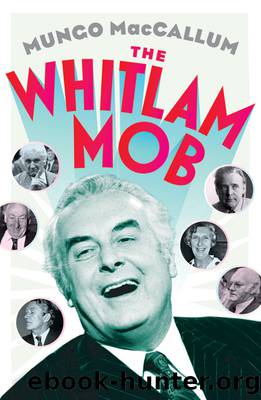The Whitlam Mob by MacCallum Mungo;

Author:MacCallum, Mungo;
Language: eng
Format: epub
Publisher: Black Inc.
Published: 2014-06-17T00:00:00+00:00
DON DUNSTAN
Gough Whitlamâs short time in office was beset by enemies on all sides, but few were as damaging as the conservative premiers. From start to finish his government was at war with the eastern-staters. There was Robert Askin in New South Wales, and Joh Bjelke-Petersen was well into his hillbilly dictatorship in the deep north. In Victoria Rupert Hamer had succeeded the terminally recalcitrant Sir Henry Bolte, but the latterâs long, broad, ultra-conservative shadow still enveloped the state. In the beginning there was some aid and comfort to be had from the minor states, but in 1974 Laborâs John Tonkin lost office in Western Australia and shortly afterwards Eric Reece succumbed in Tasmania.
Only South Australia remained in the fold, but in some ways that compensated for all the rest, because the premier of that generally benighted state was the extraordinary, the unique Donald Allan Dunstan, a like-minded progressive and moderniser who in some ways played the role of John the Baptist to Whitlamâs Messiah. The two men were rational optimists with a shared belief in the essential intelligence and goodness of humanity, natural enlargers in contrast to the punishers and straiteners who preceded and succeeded them. One of the many things they had in common was a somewhat quirky sense of humour.
One of Don Dunstanâs favourite stories concerned a pianist of Chinese ancestry performing the works of Franz Liszt before a very upper-class English audience.
After the concert, he was sought out by a gushing admirer. âOh, Mr Chang,â she enthused, âI do think itâs wonderful that someone of your race should have such a feeling for our music.â To which the pianist replied, âReally, Lady Fortescue, I had no idea you were Hungarian.â
Much of Dunstan is there: the familiarity with the arts, the loathing of racial stereotyping, the delight in pricking pomposity. Much, but by no means all. But it was this aspect of Dunstan that most people latched on to: the naughty boy from Fiji who wore pink shorts into parliament simply to cock a snook at the establishment.
They saw, and either loved or hated, according to their politics, Dunstan the iconoclast, the destroyer of images. All too often they missed Dunstan the statesman, the architect of what was, for Australia, a genuinely new kind of society. People talk about the â60s as the decade of liberalisation, but in Australia most of the â60s didnât happen till the â70s. What was widely seen as the pivotal cultural event â the hippy musical Hair â was performed in Sydney in 1969. The rise of womenâs lib as a political force took another couple of years, and the gay movement was later still. Although Aborigines had been recognised by the referendum of 1967, the push for land rights was in its infancy. Censorship was rife: police routinely attended the opening of exhibitions and performances viewed as suspect. Multiculturalism was not even a word, let alone a social reality.
And yet in a few short years, Dunstan, as premier of a minor and traditionally extremely stuffy state, turned things upside down.
Download
This site does not store any files on its server. We only index and link to content provided by other sites. Please contact the content providers to delete copyright contents if any and email us, we'll remove relevant links or contents immediately.
| Arms Control | Diplomacy |
| Security | Trades & Tariffs |
| Treaties | African |
| Asian | Australian & Oceanian |
| Canadian | Caribbean & Latin American |
| European | Middle Eastern |
| Russian & Former Soviet Union |
The Secret History by Donna Tartt(16662)
The Social Justice Warrior Handbook by Lisa De Pasquale(11494)
Thirteen Reasons Why by Jay Asher(7802)
This Is How You Lose Her by Junot Diaz(5799)
Weapons of Math Destruction by Cathy O'Neil(5046)
Zero to One by Peter Thiel(4834)
The Myth of the Strong Leader by Archie Brown(4796)
Promise Me, Dad by Joe Biden(4455)
Beartown by Fredrik Backman(4434)
Stone's Rules by Roger Stone(4423)
How Democracies Die by Steven Levitsky & Daniel Ziblatt(4414)
The Fire Next Time by James Baldwin(4350)
100 Deadly Skills by Clint Emerson(4085)
A Higher Loyalty: Truth, Lies, and Leadership by James Comey(4039)
Rise and Kill First by Ronen Bergman(4020)
The David Icke Guide to the Global Conspiracy (and how to end it) by David Icke(3891)
The Farm by Tom Rob Smith(3878)
Secrecy World by Jake Bernstein(3788)
The Doomsday Machine by Daniel Ellsberg(3737)
